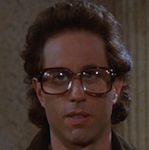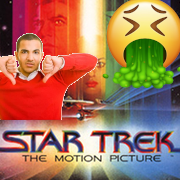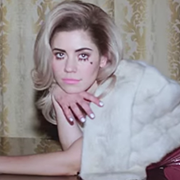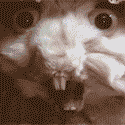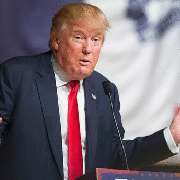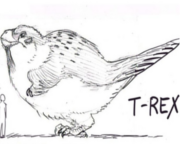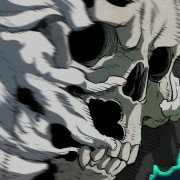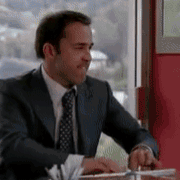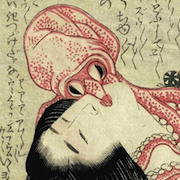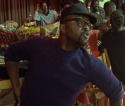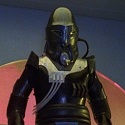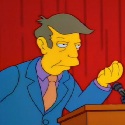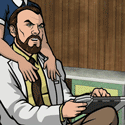|
Uncle Boogeyman posted:-the one bit I'm not totally sure about is the very ending - like, the last 30 seconds. I get that it's a metaphor for Birdman finally gaining his daughter's respect, and I think it works on that level, but I'm just not sure the movie needed not one, not two, but three scenes of "oh no, he killed himself - but maybe he didn't!" in such rapid succession. I thought it was gonna end with her joining him out on the ledge. I would've liked that more.
|
|
|
|

|
| # ? Apr 25, 2024 12:04 |
|
penismightier posted:I thought it was gonna end with her joining him out on the ledge. I would've liked that more. aw man, that's such a better ending
|
|
|
|
While I kinda of enjoyed the movie it was a bit too meta for me to really get into. The whole thing taking on the structure and melodramatic character of the kind of play Riggan was producing was just too recursive for me and kind of took me out of the movie. Also not a terribly funny movie, which isn't a crime, but was a bit disconcerting because it's been widely talked about as a comedy. I think the only time I actually laughed was when the critic delivers her take down of Riggan, and I'm not sure if that was meant to be funny, but I'll give the movie the benefit of the doubt..
|
|
|
|
When was it ever talked about as a comedy?
|
|
|
|
i'll talk about it as a comedy: it's a really funny comedy. probably the funniest movie i've seen this year, in fact.
|
|
|
|
Uncle Boogeyman posted:i'll talk about it as a comedy: it's a really funny comedy. probably the funniest movie i've seen this year, in fact. Yeah I mean there's a lot of humor in it, but I think that guy was referring to it as a comedy in the more traditional sense.
|
|
|
|
Jose Oquendo posted:Yeah I mean there's a lot of humor in it, but I think that guy was referring to it as a comedy in the more traditional sense. I had it recommend to me several times and saw it reviewed in the press as a "dark comedy". Which again, I don't hold it against the film that people mischaracterized it, but it was kind of weird.
|
|
|
|
it was at least as funny as the last Coen Brothers movie, and funnier than 22 Jump Street
|
|
|
|
GhostofJohnMuir posted:I had it recommend to me several times and saw it reviewed in the press as a "dark comedy". Which again, I don't hold it against the film that people mischaracterized it, but it was kind of weird. That isn't a mischaracterization at all, it was a black comedy. It's OK to not find it funny.
|
|
|
|
I've been waiting for this to come out at cinemas in the UK since I first heard about it last year. Just been to see it tonight, and I was not disappointed. Keaton and Norton gave stellar performances - Keaton in particular during his "acting" when fighting Norton, the choking up etc. I liked the "reference" of sorts back to the start of the film and the first scene we see of the play being rehearsed. I can't remember the exact words said, but I think it's Naomi Watts' character who says that the man they're talking about (Ed?) tried to kill himself but couldn't even do that properly, he just shot himself in the mouth. Tickled me, with the whole "shooting himself in the nose" thing. //edit: I'm dumb, this scene is a 'flashback' to the one mentioned at the start of the play, so of course it references it. Hnnnngh. Loved the cinematography - the "one long shot" was quite unsettling towards the end. Did they do some sort of weird CGI fuckery on Keaton during his Birdman sequences (apart from having the Birdman suit on him, of course) - his visible facial features didn't really look like him at all, especially during the big action scene. GazChap fucked around with this message at 00:41 on Jan 9, 2015 |
|
|
|
GazChap posted:Did they do some sort of weird CGI fuckery on Keaton during his Birdman sequences (apart from having the Birdman suit on him, of course) - his visible facial features didn't really look like him at all, especially during the big action scene. I just assumed that was a stunt double.
|
|
|
|
Xealot posted:I saw this in LA over the weekend and thought it was great. Anything that can play with subjectivity in such a surreal way scores points with me, even if the "gimmick" of it feeling like a continuous take occasionally felt like a chore (that is, knowing that you can't get to this or that moment until the character takes you there. After a while, you just wish it could cut to a new scene.) I want to defend the gun thing a bit, the thing is shooting off his nose was meant to show his attempts to disassociate himself with the Birdman character since he is getting rid of his 'beak' while at the same time going for the kind of arbitrary 'artistic sacrifice' that will finally get him accepted by theater goers as a true artist who is willing to die for his art and all that. The image of him in the hospital with the bandages that look like a bird mask show that hes probably failed, he's still seen as birdman, and his behavior (the accidental nude walk to the theater, the ludicrously sensational shooting himself in the face) suggest that though he's found his fame again its circumstances that less to do with his display of his deep, subtle and serious acting ability and more to do with his headline grabbing melodramatic actions that get posted on youtube for a zillion hits, probably not really what he was going for initially. I don't think the film is pitching its tent to say low art is bad and high art good or vice versa, the issue is his acceptance by either crowd, the 'High' (or as his daughter describes them as a tiny bunch of old white people who like to feel smart) or the 'Low' (who appreciate him as that guy from those birdman movies who runs around in his knickers), this is why I actually like the scene with the critic, the realism of the scene or character doesn't matter, its just trying to show his frustrated attempts to be accepted by a world that's pretty exclusive and hostile towards him no matter what and why exactly? What IS wrong with being the guy who was in those Birdman films? Why does he need to validated by a crowd he's never really had a whole lot to do with? the ending is meant to be ambivalent does the birdman trap him or free him? has he embraced his life or given up? Is he now really appreciated as a great actor or as a kitschy has-been whose extreme behavior gets the arty crowd to throw him a bone?
|
|
|
|
I think I enjoyed this a lot more than I liked it, which is not a reaction I can remember having before. Some great performances, good score, dialogue that worked more often than it didn't, and I've always been a sucker for long continuous shots - so lots of fun overall. But whenever we got into magical realism territory it just made me think about all the other movies I've seen do similar things in much more interesting ways. By the time we hit Birdman's monologue I wished I was watching Adaptation instead and the ending was eyes rolling out of head territory. I actually kind of liked Norton's mostly vanishing at the end, though. After that last round of truth or dare everyone was done with him and he certainly didn't have anything personally meaningful to do.
|
|
|
|
GazChap posted:Did they do some sort of weird CGI fuckery on Keaton during his Birdman sequences (apart from having the Birdman suit on him, of course) - his visible facial features didn't really look like him at all, especially during the big action scene. I'm pretty sure Keaton was never in the Birdman suit. A burly young actor with his heroic growl, literally taunting him from the past.
|
|
|
|
it was definitely a stand-in following him around (there are set photos showing as mich), but they superimposed his eyes and mouth onto the body and i think they might've given him more of a Heroic Chin
|
|
|
|
I found it a little weird that Birdman had a growl, even though Keaton's Batman didn't have that feature; after all it's Bale known for having a mouth filled with nuts and bolts. But I suppose that it also is symbolic of how Riggan secretly, despite his high-art ambitions, wants to be relevant in that way again; he doesn't go for the smooth heroic Birdman like he was in the ninties, he still wants to be current king of the hill by modernizing who is alter-ego is.
|
|
|
|
I'm dreading all the indie films that are going to start making films in one take again, 99.9% of which will be incredibly awful. It was bad phase the last time around and it isn't like it'll be any better this round.
|
|
|
|
Examples?
|
|
|
|
umalt posted:I found it a little weird that Birdman had a growl, even though Keaton's Batman didn't have that feature; after all it's Bale known for having a mouth filled with nuts and bolts. But I suppose that it also is symbolic of how Riggan secretly, despite his high-art ambitions, wants to be relevant in that way again; he doesn't go for the smooth heroic Birdman like he was in the ninties, he still wants to be current king of the hill by modernizing who is alter-ego is. Katon's Batman clearly had a growl. Not as extreme as Bale's but he definitely talks deeper as Batman than Wayne. The "I'm Batman" line specifically comes to mind.
|
|
|
|
I loved the performances in this, and there wasn't really a weak link in that department. The flow, formal composition, and editing were really impressive. On the other hand I think it really fell flat in the final act, and definitely everything after Riggin shot himself. It had moments of excess that felt unnecessary. I found the Birdman telekinesis and CGI explosion poo poo that only lasts for 2 minutes (most of which makes it into the trailer) didn't add anything to the film. I get what it was trying to say but it just felt hamhanded and out of sync. Unearned, maybe? Although I'm sure the trailer being filled with action-bits could be a meta-commentary, too. I'll probably watch again in a few years and, though I've really fallen out of love with his style, it's probably Inaritu's best. BeanpolePeckerwood fucked around with this message at 23:52 on Jan 17, 2015 |
|
|
|
To those expecting it to be more comedic, I can sympathize, as the funniest line in the movie was the third sentence. "Smells like balls" had me laughing for about half a minute. Strangely, I found it simultaneously boring and intriguing. A lot of meta. Probably need to watch it again more carefully. I thought at the end that Keaton's character represented a hero genre that just wanted to die, but his daughter, representing millenials, had inherited the delusions and saw him fly up and away, hence continuing the otherwise dead and defunct genre. She wanted to believe that she was 'super' as well, as Norton convinced her.
|
|
|
|
Regarding Norton's disappearance: This was something I noticed right after I saw the movie this weekend and I got the impression it was intentional. The movie seemed to be doing that whole "the reality of the play mirrors the narrative within the play," but on a slightly different level with the movie's narrative mirroring Riggan's narrative as an actor in a play. Basically shifting everything up one narrative level, but the same idea. In Riggan's setting, he's brought an incredibly talented and well-known actor into his production and he gets pissed off when that actor begins to upstage him, so he starts stepping up his own game in order to take control of the play back from Mike. Similarly, Michael Keaton's character is getting upstaged by Edward Norton's character, so Keaton has to step up his acting and take control of the narrative back from Norton. The movie sort of subconsciously mirrors this by having Keaton's acting become both better and just more important and by sidelining Norton. Mike-the-character doesn't disappear from the story or anything, Norton is still there in the underwear-walking scene and the opening night performance, but Riggan (and Keaton) have seized the play/film back from the younger and better-known actor by being crazy as hell. The film's narrative structure bends to Riggan's will. How effectively it did that is another matter; I can see people acknowledging it was doing that but still finding Norton's near-irrelevance in the third act odd. I guess I did, since I noticed it to begin with, but it didn't bother me once I thought about it and about the "Mike is stealing my publicity" part. Norton is so good he steals the show from Keaton, just like Mike's stealing it from Riggan. He's got to be upstaged himself. As far as the message, the only conclusion I really got beyond what anyone said is that it seemed like the movie was challenging whether there's a difference between art and spectacle. Riggan hates Birdman because he sees Birdman as the avatar of cheap spectacle that isn't real art, but he's also jealous of the success of people who engage in spectacle and celebrity so he isn't sincere about that. Birdman tells him outright in the third act that spectacle is awesome, that people love him because of it, and that's kind of borne out throughout the film. The main characters all scoff at Riggan and act like Birdman is nothing special, but everywhere he goes people love him and reporters wet themselves at the thought of a Birdman 4 and everybody recognizes him. This is pointed out multiple times, like when Mike's giving him poo poo about how he's cooler than Riggan and nobody knows who Riggan is anymore and some tourists immediately show up wanting a picture with Birdman. Or how everyone in the middle of Times Square realizes the crazy guy in his underwear is the Riggan Thomson (note that strangely enough nobody's really mocking him, they're all just amazed). It seems like Riggan becomes more conflicted in how he thinks about Birdman as the movie goes on; he acts like Birdman's criticism is intrusive early on and tries to shut it out, and then toward the end of the movie he tells someone that the voice in his head "tells me the truth." He also abandons the cocktail napkin that he says inspired him to become an actor after the scene with the critic. Once he embraces the stuff Birdman is telling him he can fly and stuff. He's indistinguishable from Birdman, the artist from the spectacle. To perfect his art, Riggan has to turn it into spectacle by shooting himself, and the payoff is that he just ends up in the same spot he was when he was Birdman. I don't know if hearing from his producer that the play is going to be huge and run for years all over the world is what he really wanted, because that sounds suspiciously similar to what Birdman was saying about doing another superhero movie and making a billion dollars. I guess the idea is he can be Icarus or he can be wading through jellyfish, no in between. Or... something. That said, after thinking about all that I really couldn't tell where the movie was coming down on it and I'm not sure if it's clear, particularly him taking off the beak-like bandage and leaving Birdman on the toilet and the ambiguous ending. I honestly don't know how I feel about the movie right now. I loved the performances, I liked the style, but I'm not sure about the message and I'm not sure if it's sure about its message. I feel like it's saying something about art and yet I'm also not really sure my own reading of the film is anywhere close to correct or if the things I noticed are even intentional (like the screwball geometry created by the single-take illusion; was that supposed to be noticeable or not?). I'm with others who hope we get more Keaton though. Nakar fucked around with this message at 20:53 on Jan 21, 2015 |
|
|
|
Nakar posted:Regarding Norton's disappearance: This was something I noticed right after I saw the movie this weekend and I got the impression it was intentional. I'm sure it was, but I felt more like the supporting actors (other than Emma Stone) had their own paticular thing they needed to do then the film didn't need them, because it's about Birdman. Norton was there to challenge his idea of being a theatre actor and to steal away his daughter and once he'd done them then he's gone. I liked the fact that the critic said almost exactly the same thing as Norton did when they first visited her in the bar as well. Nobody other than Keaton and Stone are real, they're all just reflecting parts of Keaton. That is also why I think they have the kiss between Watts and Riseborough - it feels like it's more what Keaton is imagining rather than anything else.
|
|
|
|
So this won the Producers Guild award for best movie of the year and the last seven movies to do that also won Best Picture at the oscars.
|
|
|
|
ShoogaSlim posted:So this won the Producers Guild award for best movie of the year and the last seven movies to do that also won Best Picture at the oscars. Isn't Best Picture a producer's award?
|
|
|
|
Nakar posted:Regarding Norton's disappearance: This was something I noticed right after I saw the movie this weekend and I got the impression it was intentional. The movie seemed to be doing that whole "the reality of the play mirrors the narrative within the play," but on a slightly different level with the movie's narrative mirroring Riggan's narrative as an actor in a play. Basically shifting everything up one narrative level, but the same idea. In Riggan's setting, he's brought an incredibly talented and well-known actor into his production and he gets pissed off when that actor begins to upstage him, so he starts stepping up his own game in order to take control of the play back from Mike. Similarly, Michael Keaton's character is getting upstaged by Edward Norton's character, so Keaton has to step up his acting and take control of the narrative back from Norton. I think the disappearance of Norton had more to do with Keaton's acceptance of his daughter's agency. Throughout the first two acts Keaton is very controlling of his daughter and doesn't accept her as an independent entity because she is a reflection of him, and everything in his worldview is a reflection of him. His extreme image conscienceless is his achilles heel. It's why he acts too much during the rehearsals. He's too worried about looking like "a serious actor." When Keaton sees his daughter with Norton's character for a second you think he's going to repeat his mistakes from his past and go apeshit on her for hurting him (even if she isn't deliberately doing it) and reminding him of his deficiencies as a parent. Instead, he let's it go and plays and jokes around with her in the dressing room never mentioning it to her. This is the turning point in the movie. Riggan realizes that not everything is about him, that other people have lives that may or may not intersect with his and that the one thing he should focus on is himself instead of how other people look at him or at the people he thinks represent him. It's when he drops this pretense that he is really able to wear his heart on his sleeve on stage. All the other characters fade away because suddenly they don't matter to Riggan's personal growth as he learns to accept his daughter's adulthood and stops trying to control everything around him.
|
|
|
|
I liked this movie but went in expecting to love it. It's certainly deeply flawed for reasons that pretty much everyone has gotten into--characters and their storylines are just sort of left hanging; the theater critic is over the top; the three successive "did he kill himself or not?" sequences are frustrating. But I did enjoy it, particularly Keaton's and Norton's performances and the whole one-take thing. I was also very confused about the play within the movie until I realized about 70 minutes in that Raymond Carver is not Raymond Chandler.
|
|
|
|
Both are cool, though.
|
|
|
|
chemosh6969 posted:I'm dreading all the indie films that are going to start making films in one take again, 99.9% of which will be incredibly awful. It was bad phase the last time around and it isn't like it'll be any better this round. I didn't realize this was ever a thing. The only other film I know that's done it, barring something experimental like Wavelength, is Russian Ark. edit: I guess Rope would count too, since like Birdman, it masks the cuts. TrixRabbi fucked around with this message at 18:17 on Jan 27, 2015 |
|
|
|
Hopefully we can meet somewhere in the middle and get more long takes maybe even whole scenes in one take but not necessary whole films. That one take scene in True Detective is one of my favorite things ever.
|
|
|
|
"Is this for real or is for a movie?" *long pause* "A movie" Two lines, very awesome. Timett posted:That one take scene in True Detective is one of my favorite things ever.
|
|
|
|
Jake Armitage posted:the "one long shot" which was neat, and well done, but didn't add anything to the narrative and in fact confused the audience unnecessarily in a couple places I thought the continuous, frenetic pace really captured Riggan's bipolar mania and forced the audience into his perspective in an elegant way. I mean, it's fairly obvious that nearly everything in the movie is from the protagonist's perspective: every scene involving Ed Norton (in which Riggan is not present) involves talking about his own impotence, peacocking his dick in front of Emma Stone, or attempting to rape Naomi Watts. Similarly, Naomi Watts gains the camera's perspective exactly once and she immediately has a lesbian experimentation scene - at Ed Norton's expense! - with Riggan's other love interest in the movie. The "long-take" is intimately connected with Riggan's narcissism, monomania, and paranoia. It helps the audience understand the lens through which these scenes are taking place (Riggan's imagination) and communicates it in a fun way. If it confused you I am sorry.
|
|
|
|
My God this was a great movie, I went in with high expectations and it surpassed all of them. Many intelligent things have been said about it already, so I'll just throw in my love for the scene after his lengthy flight around the city where the cab driver storms into the theater, it holds on the doors for awhile, then he emerges grumpily counting his money and drives away.
|
|
|
|
When Riggan snapped his fingers and the car blew up, I thought, holy poo poo this movie just got AWESOME! And then Birdman called me an idiot. Good stuff.
|
|
|
|
I loved this movie. Maybe the best I've seen so far this year. Keaton, Norton and Stone sold me completely.
|
|
|
|
The best representation of the film's thesis (High/Low Art) is the construction of the film itself. It's a serious film about art, with tons of really good physical comedy and lines about cupping balls. It's also telling that Norton's two big things about authenticity (The gin and the erection) both break the flow of the play, reminding us that it's all a construction anyway, that authenticity is a symbolic language too. Oh yeah, the other point of showing the modern comic book stars is that they are all still serious actors. Fassbender alternates between Magneto and Cronenberg, Downey Jr can just do whatever he wants. That rule of comic book stars not being allowed to be serious actors is gone. Snowman_McK fucked around with this message at 01:12 on Feb 16, 2015 |
|
|
|
I didn't see this mentioned, but about halfway through the movie the camera sort of wanders around the backstage while there's a rehearsal or preview going on, and the orchestra is playing Ravel's Pavane For A Dead Princess. Which is the song that played when Bruce Wayne ballroom danced with Selena Kyle in Dark Knight Rises. https://www.youtube.com/watch?v=GKkeDqJBlK8
|
|
|
|
I don't know if this was my imagination or not, but at the beginning of the movie, it looked like Keaton was kinda going through the motions, and was kinda blah facially. By the time of the last preview, his eyes were crazy like old Keaton, he was moving around a lot more, waving his arms more, and had more power in his voice. It was like watching him return to late 80s form, and it was great to see.
|
|
|
|
This was posted in the Oscar Thread, but should be seen here too: Big Birdman
|
|
|
|

|
| # ? Apr 25, 2024 12:04 |
|
Finally saw this, my feelings are a bit mixed. I was really enjoying the first three quarters or so, but like a lot of people here I wasn't sure what to feel about the ending. Ed Norton really does disappear from the movie (and I found him to be the most interesting character), Emma Stone's character gets gradually less and less interesting as the movie goes on as well. Loved the fact that it looked like one take. The movie is super indulgent but it's always really playful and fun to watch. The way the camera is always following people around combined with the awesome score made everything very frantic and energetic, it's a really snappy movie. I loved how the play seems kinda hokey and overdone, it's just so ridiculously dramatic. I loved the gratuitous action scene. It felt like it was right out of Transformers. Pretty much perfectly done. Whoever said it feels like a play was spot on. I'm not sure why the one take makes it feel like that but it certainly does. On the other hand a lot of the dialogue is really on the nose, especially the critic scene. Characters just straight up announce their motivations to the screen. Maybe that's sort of the point though. In most scenes where people are doing this, the person they are speaking to is completely out of frame. It's like they're speaking to the audience directly- I think that contributes a lot to the play-like feel of the movie as well. I read the telekinises as the power of celebrity. He's tempted by it when The Birdman is speaking to him- you belong here, above all these people. And remember that his daughter shows him the youtube video where he's in his underwear, and she says "this is real power." So at the end he's become a celebrity again. I'm not sure if it's meant to be a positive thing or not. Does he really have more integrity at the end than he did at the start? He gains fame from his crazy behaviour and the "gimmick" of shooting himself on stage. But I suppose the important thing is that he's accepted it, it's no longer torturing him? That would tie into the movie's idea of there being no difference between high and low art. Still not sure about those last 30 seconds though. One thing that was really subtle and I might be imagining- anytime Riggan is having a horrible time backstage his performance seems better and more sincere. When his producer tells him there are people lining up outside and Riggan is super happy about it, his performance gets worse again. I thought the movie was going to be all these actors destroying themselves and going through horrible drama backstage- resulting in an amazing play despite all expectations. So I was a bit disappointed that everyone else sort of dropped out of the movie by the end. A final thought- I've been watching a lot of Paul Thomas Andersen movies lately and this really felt like if you took one of the extended take party scenes from Boogie Nights and stretched it into a whole movie. The subject matter would be something PTA would be all over as well, although his version would probably be a lot more ominous.
|
|
|


